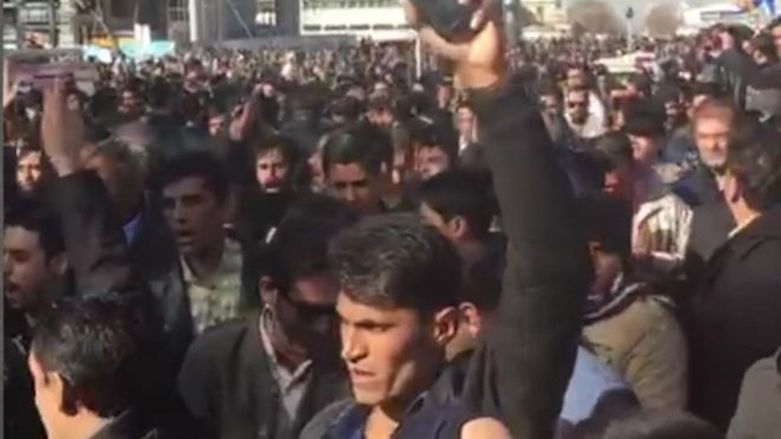Anti-government demonstrations in Iran continue second day, becoming country-wide protests

ERBIL, Kurdistan Region (Kurdistan 24) - Anti-government demonstrations in Iran continued into a second day, becoming country-wide protests.
The demonstrations began Thursday in the northeastern city of Mashad, Iran’s second-largest city.
On Friday, they had spread to Kermanshah, in the Kurdish west and included protests in Tehran, as well as Qom, the Shiite theological center that played a crucial role in the 1979 Iranian revolution.
The demonstrations began as protests against soaring prices, but quickly took on a political character, as widespread corruption, as well as Iran’s costly interventions in Syria and Iraq, became topics of public anger.
Videos widely shared on social media show Iranians chanting slogans, such as "death to dictator" and "down with Rouhani," referring to the Iranian president, widely regarded as a moderate by western countries.
In Kermanshah, which suffered a devastating earthquake last month, videos showed police attacking protestors with batons.
The biggest protest was on Thursday in Mashhad, a wealthy, conservative Shiite shrine city.
Reports say at least 52 protestors have been detained so far.
Despite the government arrests, threats, and attacks, calls for protest continued to circulate on social media.
Popular anger was sparked by large increases in the price of basic goods. The cost of an egg doubled in a week.
The anger at the inability of the government of President Hassan Rouhani to control prices developed into broader anti-government protests, which called for the release of political prisoners and an end to police beatings.
Protesters chanted against Rouhani and called for “the economically corrupt” to be executed, videos shared on Telegram and Twitter show.
Rouhani’s government has faced criticism since his reelection in May, from both hardline opponents and disillusioned supporters, who had been expecting a broader economic recovery following Iran’s 2015 nuclear deal with world powers and the easing of international sanctions.
Households have been strained by the rising price of key goods, while exploitative behavior by unregulated lenders has also triggered unrest over the past six months.
Rouhani’s first vice-president, Eshaq Jahangiri, dismissed the demonstrations in a speech on Friday, saying that economic issues were “being used as an excuse and something else, behind the curtain, is going on,” the Iranian Students News Agency reported.
In Mashhad, Ayatollah Ahmad Alamolhoda, the leader of Friday prayers there, who is seen as a close ally of Supreme Leader Ayatollah Ali Khamenei, warned that protesters should not allow their concerns “to become fodder for the foreign media, which wants to sow sedition.”
A day earlier, he had said that people had a right to be unhappy with the economic situation.
A clip circulating on unofficial Telegram channels purportedly from Nishapur, a city close to Mashhad, showed protesters chanting “leave Syria alone, think about us.”
The complaint apparently refers to Iran’s economic and military support for Syrian President Bashar al-Assad, at a time when Iranians suffer economic hardships and other problems.
Editing by Laurie Mylroie
